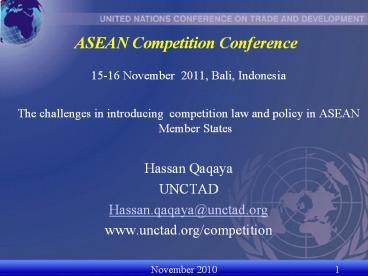ASEAN%20Competition%20Conference - PowerPoint PPT Presentation
Title:
ASEAN%20Competition%20Conference
Description:
... The economic circumstances; ... increase the level of awareness of the benefits of competition for effeciency and consumer welfare. – PowerPoint PPT presentation
Number of Views:109
Avg rating:3.0/5.0
Title: ASEAN%20Competition%20Conference
1
ASEAN Competition Conference
- 15-16 November 2011, Bali, Indonesia
- The challenges in introducing competition law
and policy in ASEAN Member States - Hassan Qaqaya
- UNCTAD
- Hassan.qaqaya_at_unctad.org
- www.unctad.org/competition
2
outline
- 1. ASEAN competition regime a regional
framework in the making - 2. Five groups of countries
- 3. ASEAN Needs and Challenges
- 4. Key issues for considerations by ASEAN
countries in the introduction of competition law
and policy - 5. UNCTAD technical assistance in preparing a
competition policy and a law - 6. An ASEAN cooperative response the needs and
challenges - 7. Concluding remarks
3
1.
- ASEAN competition regime a regional framework
in the making - By adopting the AEC Blueprint in November 2007,
ASEAN Leaders have committed to endeavour to
introduce competition policy in all Member States
by 2015 - At the time of the adoption of the AEC Blueprint
in 2007 Indonesia (1999), Thailand (1999),
Singapore (2004),Vietnam (2004) had already a
competition law in place - Laos 2004 Decree on competition, unfair trade
practices and price control, New draft in
progress Cambodia draft law since 2005 - 2010 Malaysia 2011 Philippines Executive order
no 45 , 2011 DOJ is designated as the Competition
Authority . Office for Competition responsable
for duties and functions under the Office of the
Secretary of Justice - Brunei (2011) preparartory process launched by
Prime Minister, - Mynamar (2011) request for TA
4
At least five groups of countries
- Countries with a competition law with actual
cases of enfoncement - Countries with a Competition Law and begining
enforcement - Countries with a Competition Law but without
enforcement - Countries without a competition law but with
drafts already made and close to adoption - Countries without a competition law but draft
laws at various stages - Others
5
Asian countries Needs and challenges
- Do all Asian countries face the same challenges?
- Does capacity building and technical assistance
need to be calibrated to suit local
circumstances? - What should be the form of delivering capacity
building and TA? - How to assess the effectiveness of capacity
building ? Impact ? Sustainability?
6
Key issues for considerations by ASEAN countries
in the introduction of competition law and policy
- Countries have to take into the follwing
considerations - The economic circumstances
- The Political and social choices
- The legal environment
- The relative roles of state and private sector in
the economy - The policy maker vision of competition policy
7
UNCTAD approach to preparing a competition policy
and a law
- Stage One
- Preparation of an economic mapping
- Preparation of a legal inventory of all laws and
rules having a bearing on competition law and
policy - Preparation of a competition policy framework
report - Drafting the terms of reference for the scope,
principles and institutional framework for the
law - Layman draft of the competition law
- Internal and external Consultations on the draft
law
8
UNCTAD approach to preparing a competition policy
and a law
- Stage two
- Stakeholders consultative meetings
- Finalisation of the competition bill
9
UNCTAD stages of preparing a competition law
- Stage three
- Setting up an institutional framework for
enforcing the law - Preparing rules and regulations
- Communication how the agency intends to apply the
substantive content of the law - Appointing key staff ( Chief economist, legal
advisor, etc,, - Develpoing an advocavy and communication strategy
- Etc.
10
The UN Set of Principles on Competition is a
multilateral code addressed to governements and
Multilational enterprises
- UN General Assemly resolution No. 35/63
(5.12.80) - Main features
- - Includes among its objectives the development
dimension - Non binding norms
- framework for voluntary cooperation including
case specific consultations - Exemptions of state action.
- UNCTAD Model law on Competition
- Provision of Technical assistance.
- The UN Set of Principles om Competition Policy
- 1980
10
11
12
Capacity building in the area of enforcement
- Advocacy
- Cartel investigation
- Merger control
- Anti-competitive agreements
- Abuse of dominance
- Cooperation with sector regulators
- Handling multiple criteria
- Judicial review
13
Common challenge Formulation of a competition
Policy
- Priorities have to be defined to formulate
national competition policies to ensure coherence
between competition law and other public policies
and remove unjustified state sponsored cartels
and monopolies - increase the level of awareness of the benefits
of competition for effeciency and consumer
welfare. - Develop a phased-in approach where competition
authorities are not able to cope with
liberalization to avoid social costs ,
regulatory or political capture by firms - Develop a cooperative response.
14
A Cooperative Response
- Competition Authorities have common goals
- Increased informal contacts between competition
authorities - Technical consultations competition authorities
learning from each other - No one country has all of the answers
- Each competition agency brings unique insight and
experience based on our own economic development
experiences - Competition agencies learn from each other
- Share a common goal competition for the benefit
of their fellow citizens. - Develop common pools of expertises and systems of
knowlegde management at the national, bilateral
and AESAN level,
15
- Forms of capacity building
16
Concluding remarks
- Although there is an agreement about the
fundamental principles of an effective
Competition agency - No one country has all of the answers
- Each competition agency brings unique insight and
experience based on its own economic development
experiences - Competition agencies learn from each other
- Capacity building should be calibrated to suit
the circumstances of the beneficiary agency - National initiatives should be completemented by
cooperative responses.































